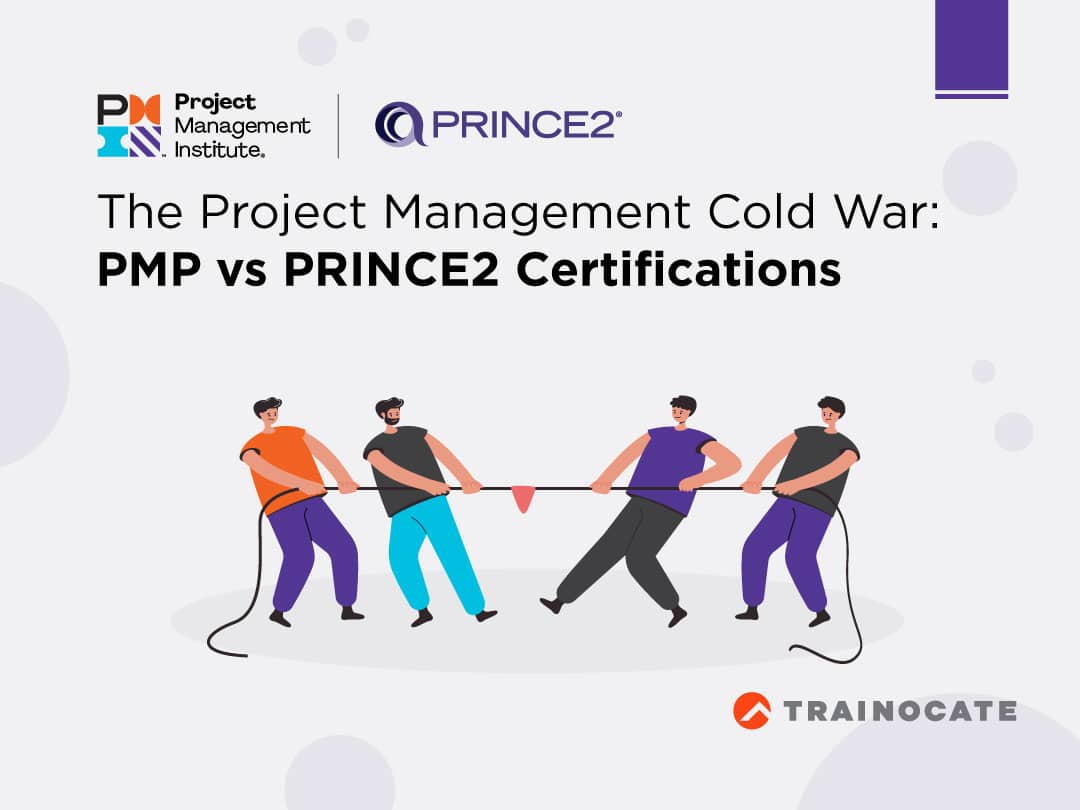The Ultimate Guide to Earning Your PMP Certification
The Ultimate Guide to Earning Your PMP Certification

Is PMP certification worth your time and effort? The PMP certification, administered by the Project Management Institute (PMI), is recognized worldwide and can significantly boost your career in project management.
In this article, we’ll cover its importance, the eligibility criteria, the application process, and exam preparation steps, so you can decide if it’s the right move for you.
Understanding PMP Certification

The Project Management Professional (PMP) certification is a credential designed for project management professionals that signifies competence in leading and directing projects.
Digital transformation will continue to reshape how projects are managed across the region — and cultivate opportunities for project professionals adept at applying next-gen tech tools.
Administered by the Project Management Institute (PMI), the PMP certification is recognized globally, enhancing the professional profile of project managers around the world. Having over one million PMP-certified professionals worldwide highlights its widespread acceptance and the high value employers place on this credential across industries such as health, construction, IT, and business.
The PMP certification is built upon the Project Management Body of Knowledge (PMBOK) Guide, which serves as a foundational resource for candidates preparing for the PMP exam. The PMBOK Guide covers essential project management concepts, including Agile and waterfall methodologies and project management fundamentals.
Now in its 7th Edition, it reflects the latest practices and methodologies. PMP certification holders are expected to have a strong grasp of managing people, processes, and business priorities effectively, which solidifies their project management knowledge and experience in the field.
The PMP certification stands out for its broad applicability across industries and its demonstration of a project manager’s expertise in handling complex projects, leading teams, and delivering results within constraints. PMI ensures that the standards and guidelines for PMP certification are maintained at the highest level, making it a robust and reliable credential for project management professionals worldwide.
Understanding the significance and scope of the PMP certification will deepen your appreciation of its role in your professional development.
Requirements for PMP Certification
To sit for the PMP exam, you must meet specific requirements demonstrating your experience and education in project management. The prerequisites for PMP certification requirements include professional experience and formal training. These requirements vary based on your educational background, ensuring you have the foundational knowledge and experience needed for success in project management.
Educational Background and Experience
The educational background and experience requirements for PMP certification are tailored to accommodate different levels of formal education. Earning your PMP certification is a commitment. That’s part of what makes it valuable. If you have real-world project management experience, you’ve finished the hardest part.
Before you apply, make sure you meet one of the following sets of PMP certification requirements:
- Four-Year College/University Degree
- 36 months of experience leading projects within the past eight years.
- 35 hours of project management education/training or CAPM certification
- High School or Secondary School Diploma
- 60 months of experience leading projects within the past eight years
- 35 hours of project management education/training or CAPM® certification
Regardless of your educational background, you must gather verification documents for your education and project management experience before applying. PMI may conduct an eligibility audit on randomly selected applications to verify the provided information. This thorough verification process ensures that all PMP candidates have the necessary experience and knowledge to earn the certification.
Training Hours
In addition to work experience, candidates must complete 35 hours of formal project management education, which can include various project management training programs. These training hours can be fulfilled through online courses, community college classes, or PMI preparatory courses, allowing candidates to learn at their own pace.
After: Candidates must complete 35 hours of formal project management education, which can include:
- Various training programs
- Online courses
- Community college classes
- PMI preparatory courses
These training hours allow candidates to learn at their own pace.
Alternatively, if you hold a Certified Associate in Project Management (CAPM)® certification, you can waive this training requirement for the PMP certification. This flexibility ensures that candidates can meet the educational requirements in a way that fits their schedules and learning preferences.
Costs Associated with PMP Certification

The overall cost of obtaining PMP certification includes not just exam fees but also additional expenses like study materials and training resources.
It’s crucial to budget for these costs to ensure you are fully prepared for the certification process.
Exam Fees
The PMP exam fee for the first attempt is $575 for non-members, while PMI members pay $324. The annual fee for PMI membership is $129, which can lead to savings on the exam fee.
Considering the financial investment required, the total cost of obtaining PMP certification, including course fees and exam costs, can be around $2000.
Training Course Expenses
The costs for PMP training courses vary widely, ranging from $300 to $3,000 depending on the provider and format. Some training providers offer flexible payment options, such as interest-free installments for up to six months, making it easier to manage the financial burden.
These variations in training course expenses can significantly impact the total cost of obtaining the certification.
Renewal and Maintenance Fees
To maintain PMP certification, professionals must complete 60 hours of professional development over three years. The renewal fee for maintaining PMP certification is $60 for PMI members.
Maintaining your PMP certification shows ongoing professionalism and commitment in project management.
Comparing PMP Certification with Other Project Management Certifications

Choosing between the myriad of project management certifications depends on various factors, including industry recognition, prerequisites, difficulty, cost, and time investment.
Comparing PMP certification with other widely recognized certifications such as CAPM, PRINCE2, and Certified ScrumMaster can help you make an informed decision.
Scope and Industry Recognition
The PMP certification is widely recognized across various industries globally, making it a highly valued credential for project managers. In contrast, PRINCE2 is particularly recognized in the UK and is well-regarded for its structured approach to project management.
The Certified ScrumMaster certification is widely acknowledged for its relevance in agile project management environments, emphasizing flexibility and adaptability. Knowing industry preferences for various certifications can guide your career advancement strategies.
Prerequisites and Difficulty
The PMP certification demands extensive project management experience and education compared to entry-level certifications like CAPM, which is designed for those new to project management. The difficulty of the PMP certification lies in the significant experience and educational background required to qualify.
On the other hand, the PRINCE2 Foundation certification has no prerequisite experience, making it accessible to those new to project management. Pursuing PMP certification demands more commitment in experience and study compared to entry-level certifications.
Cost and Time Investment
The cost and time investment required for different project management certifications vary significantly.
- PMI-PMP: Project Management Professional – from RM6500 – RM7000
- P2F: PRINCE2 Foundation – from RM4800-RM5500
- P2P: PRINCE2 Practitioner – from RM4800-RM5500
- CSM: Certified Scrum Master – from RM4000 – RM5500
- PSM: Professional Scrum Master – from RM4000 – RM4800
PMP certification, although more expensive and time-consuming, often leads to higher salary increases and better career prospects.
Knowing these differences helps you decide which certification best aligns with your career goals and financial situation.
Career Advancement with PMP Certification
The cost and time investment required for different project management certifications vary significantly.

Earning a PMP certification can significantly enhance your career prospects by showcasing your expertise in project management principles. The certification is widely recognized and valued in the job market, indicating your ability to lead and manage projects effectively.
This section will explore the potential career advancements, typical roles, salary expectations, and job market demand for PMP-certified professionals.
Typical Roles and Responsibilities
PMP certification holders can pursue various roles such as project manager, program manager, and IT project manager, each with distinct responsibilities. Certified project managers often lead complex projects, develop management strategies, and ensure successful project outcomes across diverse industries.
Knowing the typical roles and responsibilities associated with PMP certification helps you envision your career path and available opportunities.
Salary Expectations
On average, PMP-certified professionals earn about 33% more than their non-certified peers globally. In the United States, the average salary for PMP-certified individuals is projected to be around $120,000 annually in 2023.
These salary expectations highlight the financial benefits of PMP certification and its impact on your earning potential.
Job Market Demand
The demand for project management professionals is anticipated to grow significantly in the coming years. By 2030, approximately 25 million new project management professionals will be needed globally to meet the increasing demand. This growing need emphasizes the importance of securing PMP certification to enhance employability in a competitive job market.
As companies shift towards a project management framework, the value of PMP-certified professionals will continue to grow.
Choosing the Right Project Management Certification

Selecting the right project management certification is a crucial decision that can impact your career trajectory. Factors such as your career goals, preferred methodologies, and financial considerations should guide your choice.
Whether you aim to specialize in Agile environments with a Certified ScrumMaster certification or prefer the structured approach of PRINCE2, knowing your specific career aspirations and preferred methodologies will shape your decision.
Ultimately, aligning your certification choice with your professional goals will ensure you maximize the benefits and opportunities available in the field of project management.
Summary
In summary, the PMP certification stands out as a globally recognized credential that validates a project manager’s expertise and ability to lead and direct projects effectively.
By understanding the requirements, navigating the exam process, and comparing it with other certifications, you can make an informed decision about pursuing PMP certification.
The costs associated with obtaining and maintaining the certification are an investment in your professional development, offering significant returns in terms of career advancement, salary expectations, and job market demand. As you consider your options, remember that the right certification aligns with your career goals and preferred methodologies.
Obtaining PMP certification can open doors to new opportunities and elevate your career in project management. Still undecided? Check out our Top Reasons to Get PMP Certified in 2024 post to learn more.







